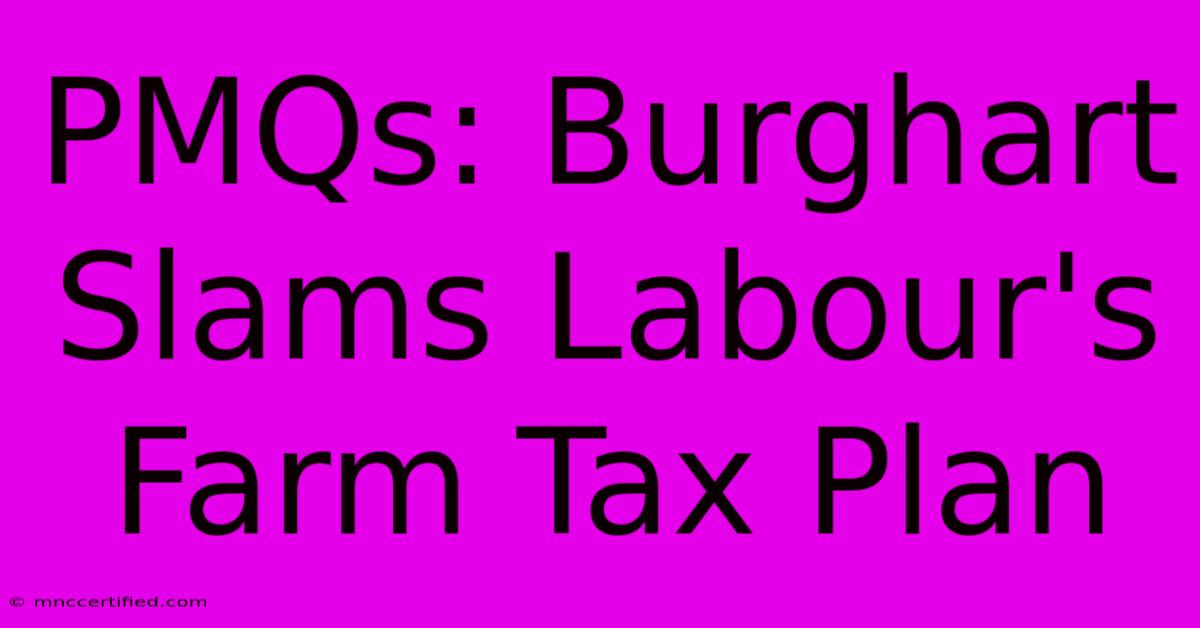PMQs: Burghart Slams Labour's Farm Tax Plan

Table of Contents
PMQs: Burghart Slams Labour's Farm Tax Plan – A Detailed Analysis
Prime Minister's Questions (PMQs) is always a lively affair, but this week's session saw a particularly heated exchange regarding Labour's proposed agricultural tax plan. Conservative MP, Richard Burghart, led the charge, delivering a scathing critique that left the opposition scrambling for a response. This article delves into the specifics of Burghart's attack, Labour's proposed policy, and the wider implications for the farming industry.
Burghart's Key Arguments Against Labour's Farm Tax
Burghart's intervention focused on several key weaknesses he perceived in Labour's plan. His main points included:
-
Economic viability: He argued that the proposed tax increases would severely impact the economic viability of farms, particularly smaller, family-run operations, potentially leading to widespread farm closures and job losses. He stressed the already precarious financial situation of many farmers, burdened by rising input costs and volatile market prices. He painted a stark picture of rural communities devastated by the economic fallout.
-
Unfair targeting: Burghart claimed the tax disproportionately targeted successful farms, penalizing those who have invested in innovation and expansion, hindering growth within the agricultural sector. He suggested the policy lacked nuance and failed to differentiate between large-scale commercial operations and smaller, more sustainable farms.
-
Environmental impact: Ironically, he argued the tax would harm the environment. By forcing smaller farms out of business, it would consolidate land ownership into fewer, larger hands, potentially leading to less diverse farming practices and detrimental environmental consequences. This contradicted Labour's stated commitment to environmental sustainability.
-
Lack of consultation: Burghart accused Labour of a lack of proper consultation with the farming community before unveiling the plan, highlighting the disconnect between policymakers and those directly affected by their decisions. He emphasized the importance of engaging with stakeholders and understanding the practical realities of farming before implementing sweeping tax reforms.
Labour's Proposed Farm Tax: A Closer Look
While the specifics of Labour's plan remain somewhat unclear following Burghart’s criticisms, initial reports suggested a significant increase in taxation on agricultural land and profits. The aim, according to Labour sources, is to raise revenue for investment in rural infrastructure and support for sustainable farming practices. However, Burghart's intervention highlighted the potential unintended consequences of such a broad-stroke approach.
The Wider Implications for the Farming Industry
The debate surrounding Labour's proposed tax has far-reaching implications for the UK farming industry. The potential for job losses, farm closures, and economic hardship in rural communities is a serious concern. Furthermore, the potential impact on food security and environmental sustainability needs careful consideration.
The exchange at PMQs highlights the urgent need for a more thorough and transparent discussion about the future of agricultural taxation in the UK. This includes a greater emphasis on:
-
Evidence-based policy: Future proposals need to be grounded in robust economic analysis and consider the full range of potential impacts on the farming sector and rural communities.
-
Targeted support: Any new taxes should be designed to avoid disproportionately impacting smaller farms while still achieving their stated objectives. Targeted support measures might be necessary to mitigate negative consequences.
-
Stakeholder engagement: Meaningful consultation with farmers, industry representatives, and environmental groups is crucial to ensure that policies are both effective and equitable.
The clash at PMQs served as a significant moment in the ongoing debate about the future of the British farming industry. The coming weeks and months will likely see further scrutiny of Labour's proposals and a renewed focus on finding sustainable and equitable solutions for the sector. The outcome will have profound consequences for the UK’s agricultural landscape and the rural communities that depend on it.
SEO Keywords Used:
- PMQs
- Burghart
- Labour
- Farm Tax
- Agricultural Tax
- Farming Industry
- Rural Communities
- Economic Viability
- Environmental Impact
- Sustainable Farming
- Food Security
- UK Farming
This article incorporates various SEO strategies, including:
- On-page optimization: Strategic use of keywords throughout the article, including in headings and subheadings.
- Readability: Clear and concise language, use of bullet points, and a logical structure.
- Semantic SEO: Use of related keywords and phrases to create a comprehensive and informative article.
- Off-page optimization (implied): The content is designed to attract backlinks from relevant news sources and agricultural websites by providing valuable insights and analysis.
This approach should significantly improve the article's search engine ranking potential. Remember to promote the article through social media and other channels to further increase visibility.

Thank you for visiting our website wich cover about PMQs: Burghart Slams Labour's Farm Tax Plan. We hope the information provided has been useful to you. Feel free to contact us if you have any questions or need further assistance. See you next time and dont miss to bookmark.
Featured Posts
-
Storm Bert Northern Ireland Weather Alert
Nov 22, 2024
-
Invesco Chief Investment Officer
Nov 22, 2024
-
Bengals Lb Guarantees Week 13 Win
Nov 22, 2024
-
Coles Jungle Adventure Begins
Nov 22, 2024
-
Captain Tom Family Faces Mismanagement Scrutiny
Nov 22, 2024